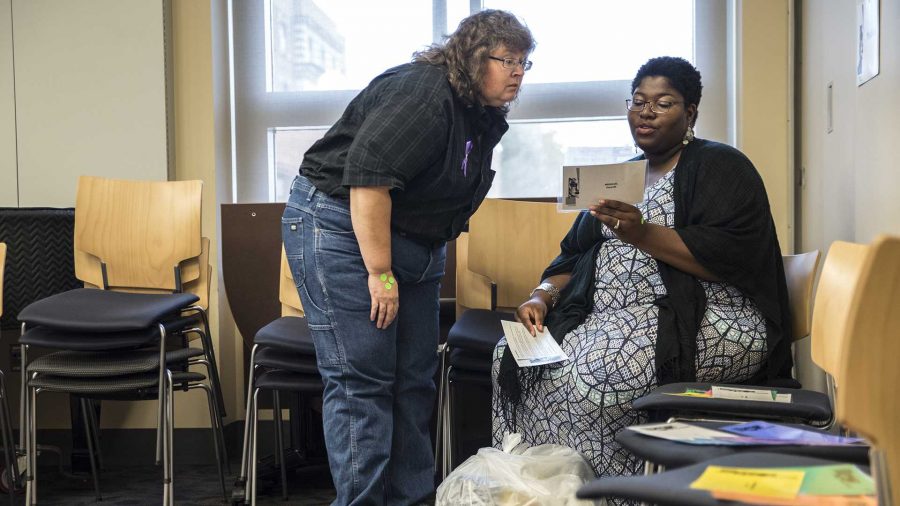In light of Domestic Violence Awareness month, an event Sunday afternoon educated community members on the numerous facets affecting individuals and families in domestic violence situations.
The event, “In Her Shoes,” was facilitated by the Domestic Violence Intervention Program and the Johnson County Coalition Against Domestic Violence.
“In Her Shoes” used an interactive simulation to promote awareness and to give participants an opportunity to understand the possible circumstances and barriers a person experiencing domestic abuse may encounter. It sought to provide insight for the 1 in 3 women and 1 in 4 men who have been affected by domestic violence.
There were 17 stations representing various places or people such as a hospital, clergy, friends and family, emergency shelter, and more. The 15 or so participants gathered were also given one of eight character cards that influenced their decisions throughout the simulation.
DVIP Director of Community Outreach Alta Medea-Peters said the character cards and situations are based on true stories from survivors.
“They’re real-life experiences from all over the country,” she said.
For example, Medea-Peters said, one of the character cards is of a woman who is learning English as a second language. She said that language is an important thing to consider when discussing navigating the system.
The community members’ role in the simulation was to make choices for their characters despite the adversity that arose. Each choice had various positive or negative repercussions.
RELATED: Conference highlights need for improvement in Iowa’s gendered violence policies
University of Iowa freshman Aastha Chandra said she found the simulation to be eye-opening.
Chandra navigated as a character who was disabled and eventually had to return to her abuser three times before being killed.
“I was aware that there were many avenues available for people in these situations to get help,” Chandra said. “But I didn’t realize how they could actually be detrimental, not help at all, or make their situations worse.”
Chandra said her character felt as though she couldn’t go to child protective services out of fear of losing her child.
After the simulation, a discussion was facilitated by DVIP Assistant Executive Director Dee Dixon.
“During that period where we’re having discussion, people are able to hear each other’s stories,” Dixon said. “It’s so enriching and important for people to understand that if they have experienced domestic violence, they’re not alone, and if they haven’t, then they likely know somebody who has. We’re all a part of that solution.”
Dixon said they host the simulation for the community, law enforcement, educators, social workers, and more.
“While reading these cards, you’re able to have some insight into the challenges on someone’s journey trying to free themselves from domestic violence,” she said.
DVIP serves eight counties with a 24-hour crisis hotline, emergency shelter, counseling, medical advocacy, legal advocacy, child-support services, and more. It also provides community education and training.



